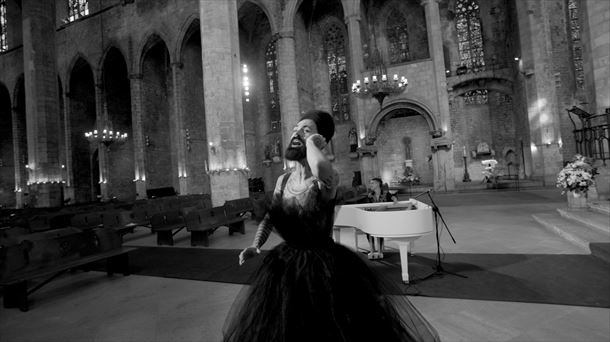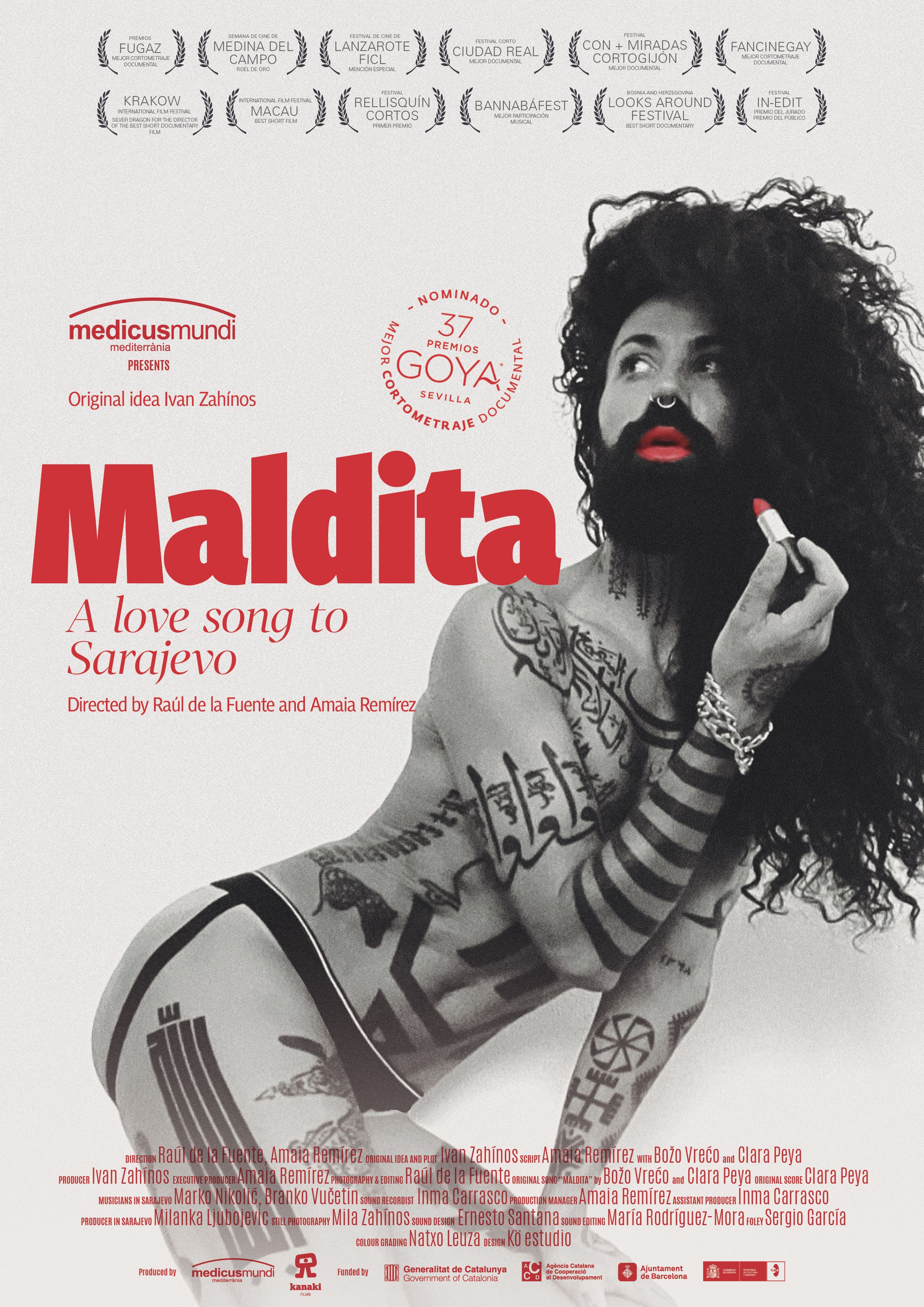Euskaraz irakurri: “Fede handia dugu ‘Maldita’ren aukeretan: ikusleek asko maite dute eta erantzun polita jasotzen ari gara”
The sevdah, Bosnian popular music, melancholy sings of impossible or tragic love, and does so using sweet melodies and light structures dictated and broken by sharp voices. These are nostalgic songs about impetuous, desperate and often fatal relationships, in which echoes of Slavic lyrical songs, Ottoman chromatic melodies and Sephardic tradition converge.
Precisely, the Balkan music artist sevdah Božo Vreco is the protagonist of the latest documentary short film by Raúl de la Fuente and Amaia Remírez (“Minerita”, “El infierno”, “One more day alive”…).
“Maldita: A love song to Sarajevo”, the work that this Saturday could give the couple of filmmakers their third Goya award (they will be awarded this February 11 in Seville) is, like the sevdalinkas or sevdah songs, a love song , an audiovisual embrace of music, sensitivity and life that, unlike traditional Bosnian songs, oozes vivacity, freedom and light.
Under the elegant black and white gaze of De la Fuente and Remírez’s camera, Vreco and the Barcelona pianist Clara Peya will write “Maldita” from a distance with four hands, a song that builds bridges between Sarajevo and Barcelona, between tradition and avant-garde and also between genders.
We have spoken with Amaia Remírez, co-director and screenwriter of “Maldita. A love song to Sarajevo”, a film that claims, loves and applauds difference.
Zorionak for the nomination! How did you know that “Maldita” was one of the five nominees for the Goya for best documentary short?
The actresses Blanca Portillo and Nora Navas announced it a month ago. The co-director Raúl de la Fuente was abroad, on another shoot, and I was working… We found out thanks to messages from friends.
Have you seen the rest of the films nominated in your category? What do you think?
I have only been able to see a few yet. There is a high level of documentary short films, both fictional and animated.
Furthermore, in each of the categories there is a nominated Basque short film: in fiction, “Cuerdas”, by Esti Urresola; and in animation, “Loop”, by Pablo Polliedri, which is produced by Uniko.
You have been nominated three times for the Goya, and you have won it twice. From that experience, how would you like to live the night of February 11?
From our previous experiences, we have learned the hard way that anything can happen and that there are many factors that influence the decision: how much has the film been seen and how many times has it been mentioned in the press, has it won awards or has it been In a major festival, if someone very famous or famous has supported it, what topic is it about, the competition…
Given all these factors, anything can happen. We have a lot of faith in the possibilities of “Maldita”: the public adores it and we are receiving a precious response.
Have you prepared something in case you have to go up to collect the prize?
We’ll have something ready, in case we have to go out. They are very strict for thanks, there is only one minute.
What do the awards bring to the movies? What value do you give them?
Awards bring new life to movies. More viewers are interested, more film festivals and institutions ask you to program it, the interest of the platforms arises… For now, many more people have been able to see it thanks to the promotion.
The awards have been very important in the journey of our production company, Kanaki Films; to get new partners for films, financing, facilitate the yes of a protagonist…

‘Damned: A love song to Sarajevo’
How did you meet Božo Vreco and Clara Peya? How would you describe them and why do you think their union works so well?
Ivan Zahinos, project manager at Medicus Mundi Mediterrània, had known Božo Vreco for some years due to the long history of cooperation between Barcelona and Sarajevo.
And Clara Peya was discovered for me by a friend who lives in Barcelona, Nekane Navarro. She blew me away.
To describe the relationship between Božo and Clara, I would use the words pure, natural, spontaneous and artistic. The spark between the two caught on right away.
In addition, both share a very special relationship with music: it is healing for them. It helped Božo in his youth to cure her epilepsy, while for Clara music is a territory in which to better cope with her OCD.
After deciding what you wanted to tell, you established in the script how to do it elegantly. What criteria or imposed?
We made a lot of decisions about the form and script of the documentary before we started shooting; to begin with, that the film was going to narrate the process of creating a love song.
Later, based on the relationship between Barcelona and Sarajevo, I thought about the epistolary genre. But in the modern era, letters have taken the form of video calls via mobile; there, Raúl decided to use the split screen.
The choice of black and white was intuitive from the beginning. When you meet Božo Vreco, it is inevitable to think about duality. And in elegance. Well, black and white gives you both.
The Sarajevo war should be present, but leaving room for the present. That is why it only appears in two moments: when Božok talks about his childhood, and in the last sequence, which for me is the most beautiful in the film and in which it is impossible not to feel immersed in the war when we see civilians fleeing through the streets under sniper fire.

The city of Sarajevo appears in the documentary, as does Božo Vreco, injured but full of life and heir to many cultures, although the war in the 1990s diminished that diversity. What city did you stumble upon 30 years after the war?
We have known Sarajevo above all through Božo and people who have helped us in the production from there: we have found it hospitable, fun and diverse.
have you seen the movie BoWhat and Clara? What did you think?
They saw it at the preview we did in Barcelona. Clara is a very strict critic, and we have obtained her approval. Before seeing her, she was worried about running into a triumphalist and institutional image of Barcelona, but she has been satisfied.
Božo tearfully thanked Raúl and me for the work.
Do you have any other project in hand?
Several! This year we will finish our second co-directed project, the documentary feature film Bayo Bayo Babywhich is a story about two young men from Sierra Leone whom we have followed for six years.
We are recording another one that has to do with the Basque Country and Africa, and writing two more ideas.
Source: Eitb
Bruce is a talented author and journalist with a passion for entertainment . He currently works as a writer at the 247 News Agency, where he has established himself as a respected voice in the industry.












